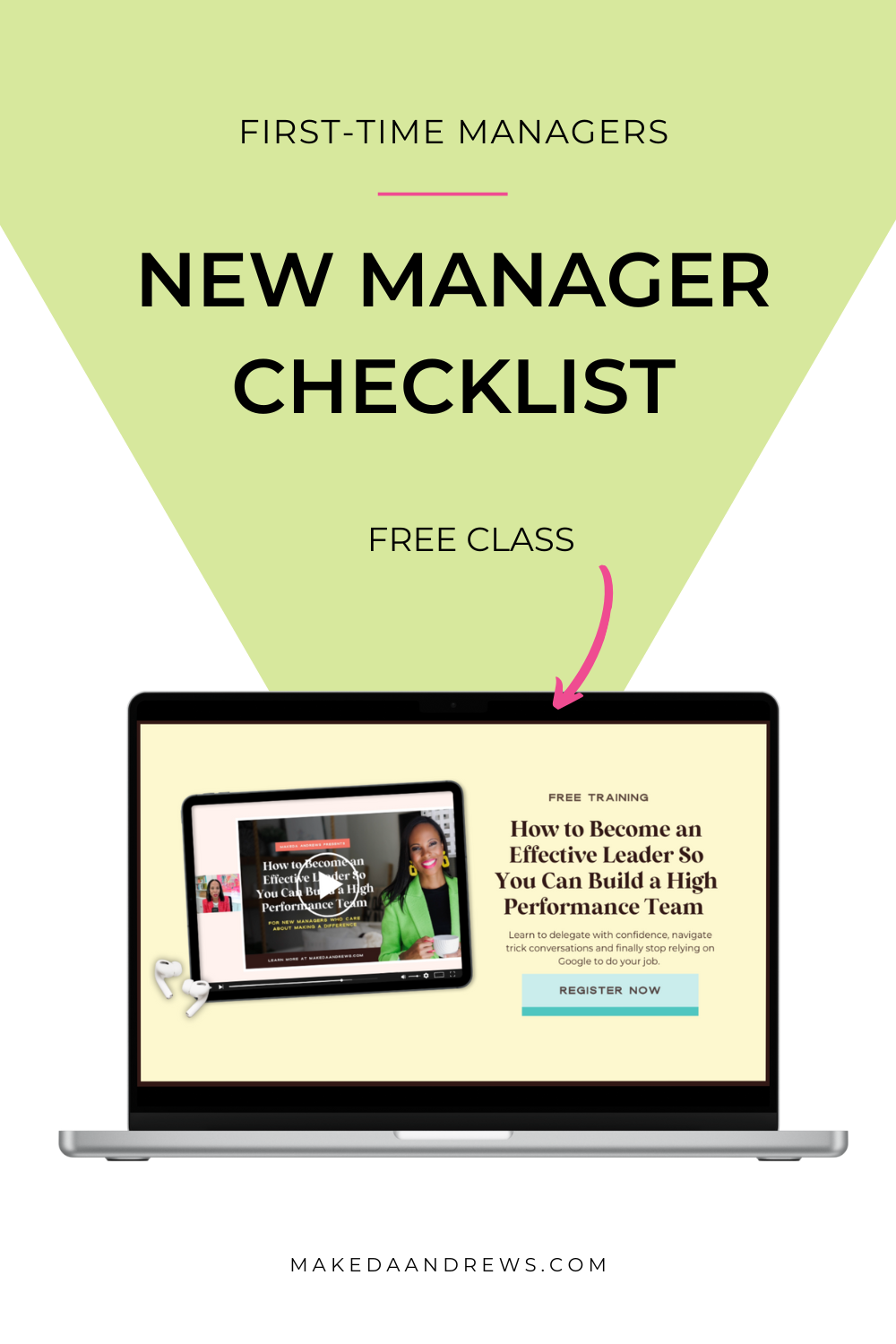New Manager Checklist You Need to Survive The First Week
Hi, I'm Mak. I'm a leadership coach for new managers who knows what it's like to be filled with overwhelm, self-doubt and terror that I’d let everyone down. My Story
FREE MICROCAST
How to Become an Effective Leader so You Can Build a High Performance Team
Learn how to delegate with confidence, navigate those tricky conversations (even for introverts!), and finally stop relying on Google to do your job.
Netflix < MakTV
THE YOUTUBE CHANNEL
No but really. This is the kinda content that’s actually healthy to binge. In fact, you become more of an awesomesauce manager with every video you watch.
Updated October 24th 2024
Congratulations! Your bosses just promoted you to manager, which means you’ll have new responsibilities, challenges, and exciting opportunities heading your way.
As a first-time manager, you must start on the right foot and gather all the essential tools for your new position. To help you navigate this transition smoothly, I have prepared the ultimate new manager checklist you need to survive your first weeks. Follow these steps, and you’ll be well-prepared to take on your new role and drive your team to success!
I know you’re excited to get started, but before jumping in, sign up for my FREE class, How to Become an Effective Leader so You Can Build a High-Performance Team, here!

New Manager Checklist: Follow These Steps for Success!
Before diving into the content, I want you to clarify that even though this is a checklist, your goal is not just to cross things off this list and move forward. You need to put in the work and spend time on each step.
Having that said, if you’re a new manager, you might be in one of two situations:
- You’re entering as a team leader in a new organization. When everything is new for you, and you’re getting to know your role and the company’s culture, follow steps 1 through 4 in the new manager checklist.
- You’ve been promoted to become a team leader in your organization. If you’re leaving your current position to jump into a new one in the same or different department, you must put in a little more work and follow steps 1 through 6.
Step 1 – Gain Clarity on Your New Role
There’s a reason this point is the first on our new manager checklist. Clarity in your role is vital for accomplishing your goals and leading others successfully.
Some actions to take in this step may include:
- Take the time to fully understand your role and responsibilities through reading and understanding your job description, approaching your bosses, asking questions, etc.
- Review the SOPs in place for your role to fully understand and play your part as expected.
- Know your ultimate goals, KPIs, and other metrics you need to fulfill.
- Understand your manager’s expectations and deliverables for your role. A great question to ask is: What does success look like in my role? This one question will open up a world of discussion between you and your manager and create an honest and easy approach to any issues moving forward.
- Identify improvement opportunities. Even though you’re just getting familiar with your role, review all the information and identify key aspects that can be improved to bring something new and unique to your department.
Gaining clarity also means asking for help when needed and looking for a mentor to guide you through this career transition. So, if you’re ready to become an effective leader with a high-performing team, make sure to save a seat for my FREE training!
Step 2 – Host an Introductory Meeting with Your New Team
Once you’re clear on your direction, it’s time to invite your team on board. The second step is to host an introductory meeting with your team.
The minute your managers announce you as the new leader, your new team will look for safety indicators from you. How you approach this meeting is everything and will dictate how your team will adapt to you.
To make a good impression on your team, here are some tactics to follow:
1. Make sure the setting is right. Only do this meeting when your team can see your face, meaning in person or via video conference if you are remote so that your team can see your facial expressions and you can see their reactions.
2. Plan an agenda. Here are a few things that you will want to discuss at this first meeting:
- Introduce yourself and your background
- Discuss your career background
- Share your communication style and preferences
- Discuss the next steps of what they can expect from you
- Ask team members to introduce themselves (you might want to consider using an icebreaker for this)
3. Leave time for feedback or ask any questions they need. This action alone will show your team that you’re interested in their opinion and will highlight your communication style.
What makes you nervous about this first meeting? Comment below!

Step 3 – Schedule Individual Touchpoints with Each Team Member
When change happens, people are naturally weary of the future. If you want to avoid chatter, especially with a narrative that isn’t accurate, you need to schedule individual touchpoints with each team member.
There’s nothing better than constant communication to avoid misunderstandings, so in this meeting, consider the following:
- Become empathetic and acknowledge that having a new boss is something that you understand might make them uncertain about the future.
- Talk about the transition as a new manager and its effects on each of your team members.
- Share your intentions and open the dialogue for concerns, questions, and doubts. Having this honest discussion from the beginning will help you build trust with each one.
- If you’re replacing a manager who left a mess in the department, show your competency and credibility from the beginning. Be open and have a conversation to let you know you’re trustworthy and someone different.
- On the other hand, if you’re filling big shoes and replacing a manager who was inspiring, motivating, loved, and respected, it is equally as important to set yourself up as a credible leader. Highlight your strengths and value this former manager’s contributions to the team.
- Ask for feedback to allow your new team member to feel seen and heard by you.
That said, even though this is just a point on your new manager checklist, you want to schedule regular one-on-ones with your team in your calendar. Doing so will foster respect, trust, and camaraderie.y you.
Step 4 – Listen and Ask Questions
The final step in this first section of our new manager’s checklist is to listen and ask questions.
Be prepared to sit on your hands – figuratively speaking – and listen to what’s happening around you. Your observations during this period will help you make wise decisions down the road.
Also, be curious. A new manager changes things only after first understanding the reality and the impact. Take the initiative and look at what other managers have done in the past, what worked, and what went wrong.
Getting invested from the beginning will set you up as a leader who’s more about achieving results and instead about making an impact.

If you have been promoted from within, the following steps in the New Manager Checklist are for you:
Step 5 – Define Your Current Role
Document everything you are doing daily, including the following:
- The processes you follow
- The tasks that you diligently work on each day
- The people that you work with regularly and how you connect to them
- Your high-level projects
- Specific systems or tech that you use to help you do your work
The purpose of this step is so that when you transition your current job to someone else on the team, you have documentation so that training is not by memory and vague information.
I want you to approach this first step as follows: If next week, someone else is sitting in your seat doing what you are currently doing, and you can’t talk to them, document every step and tool so they would be okay mirroring you and taking over your role.

Step 6 – Plan Your Transition
Now, chances are – right from the get-go – you will not be able to hand off everything you are doing. Transitioning from individual contributor to manager is rarely a light-switch moment. It’s going to take some time. But that doesn’t mean that you shouldn’t be planning for it.
Don’t wait until you have the green light or the official go. You want to start thinking about WHO on the team can transition into your role or if you will be spreading the work.
Consider the following:
- Potential transition dates
- Project deliverable timelines
- On-site or virtual training
- How will you be seeding that person into the role
- If you will be sharing the responsibilities and how
Document all of this and communicate the timeline with others affected by this transition. Having a proper plan in place will ensure a safe destination and a smooth transition.
The final take I want you to have is that a prepared manager is worth more than anything. It’s all about having a plan to carry you through that first few weeks as a manager. I hope this checklist will help you as a guiding baton and the first steps to take you forward in your new adventure. Comment below with any questions you have about this checklist and pin this article to come back to it when you need it!

August 18, 2020
Luckily for me, I’ve been documenting all of:
The processes I follow.
The processes I will revise and implement.
The daily & weekly tasks (diligently or otherwise) completed.
The internal and external partners I regularly connect with and how they are connected to my role, affiliated departments as well as the business.
The high level projects I manage and participate in.
Lastly, the IT systems, networks and technical aspects I utilize.
I’ve even incorporated the applicable theories and practices utilized on my own accord.
Your expertise are really laid out and make for logical application!
Yesss Jay! That’s exactly what we want to do 🙂 Document, document, document. Great job!